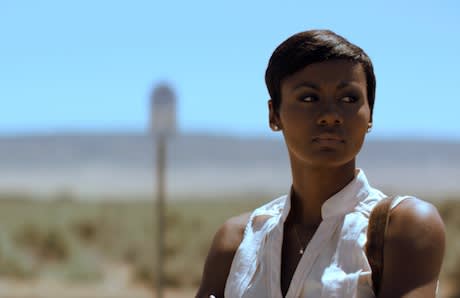With three different movies about women trying to cope with the quotidian while their husbands serve time in prison — the others being Michael Winterbottom's lifeless experimental drama Everyday, and François Delisle's touching but oblique The Meteor — making the festival rounds over the last year, Ava DuVernay's low-key character drama, Middle of Nowhere, could get lost in the shuffle.
Middle of Nowhere is the sort of film that rewards those that give it the time, having more heart and brains than it feels compelled to project, but its humble scope and focus on quiet emotional moments make it a hard sell outside of the festival scene.
When it opens, Ruby (Emayatzy Corinealdi), an emergency room nurse, is optimistic about her husband's incarceration, talking to him in the visitation room about how quickly he can be out if he exhibits good behaviour. He's apologetic and sincere about his predicament, giving the impression of a prison and legal system imposing a harsher than necessary sentence on a loving member of a romantic partnership.
But what's fascinating and compelling about DuVernay's work, which routinely uses light and shadows to reflect Ruby's level of objective honesty about her situation, is that our perspective gradually shifts as Ruby goes through the motions on her own. At first, we learn of her working two jobs to pay child support to her husband's ex, which seems altruistic until aspects of her life start to unravel.
Why her husband is in prison is initially unclear, but his mention of getting her some money on the outside suggests affiliations with some less than honest people. Similarly, her refusal to share any information or emotional baggage with her supportive mother suggests either embarrassment or denial.
It's unfortunate that the impetus behind her self-realization is the introduction of another man into her life — a bus driver that pursues her after seeing her every other day for months — but it's the sort of instigator of core conflict (fidelity) necessary to push Ruby towards some sort of catharsis.
Once she starts to open up about her feelings of guilt and responsibility for her husband's predicament, the story, which originally seems humdrum, finds its complexity, bringing everything together clearly.
It's this handling of storytelling and character revelations that make DuVernay's film something memorable, demonstrating an acute and natural eye for lyricism and subtle emotional build-up. Middle of Nowhere is the sort of hidden gem that doesn't come around often enough.
(Forward Movement)Middle of Nowhere is the sort of film that rewards those that give it the time, having more heart and brains than it feels compelled to project, but its humble scope and focus on quiet emotional moments make it a hard sell outside of the festival scene.
When it opens, Ruby (Emayatzy Corinealdi), an emergency room nurse, is optimistic about her husband's incarceration, talking to him in the visitation room about how quickly he can be out if he exhibits good behaviour. He's apologetic and sincere about his predicament, giving the impression of a prison and legal system imposing a harsher than necessary sentence on a loving member of a romantic partnership.
But what's fascinating and compelling about DuVernay's work, which routinely uses light and shadows to reflect Ruby's level of objective honesty about her situation, is that our perspective gradually shifts as Ruby goes through the motions on her own. At first, we learn of her working two jobs to pay child support to her husband's ex, which seems altruistic until aspects of her life start to unravel.
Why her husband is in prison is initially unclear, but his mention of getting her some money on the outside suggests affiliations with some less than honest people. Similarly, her refusal to share any information or emotional baggage with her supportive mother suggests either embarrassment or denial.
It's unfortunate that the impetus behind her self-realization is the introduction of another man into her life — a bus driver that pursues her after seeing her every other day for months — but it's the sort of instigator of core conflict (fidelity) necessary to push Ruby towards some sort of catharsis.
Once she starts to open up about her feelings of guilt and responsibility for her husband's predicament, the story, which originally seems humdrum, finds its complexity, bringing everything together clearly.
It's this handling of storytelling and character revelations that make DuVernay's film something memorable, demonstrating an acute and natural eye for lyricism and subtle emotional build-up. Middle of Nowhere is the sort of hidden gem that doesn't come around often enough.
